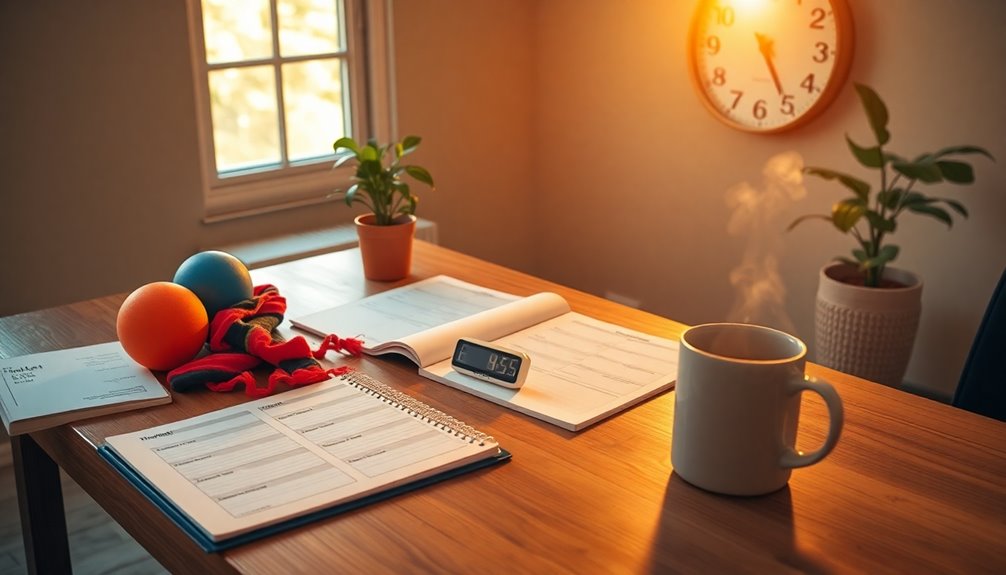You can absolutely juggle practice and life with some smart strategies! Start by setting clear goals to keep your focus sharp. Create a practice schedule that fits your lifestyle and treat those practice blocks like important appointments. Prioritize your well-being by taking breaks and incorporating short practice sessions. Minimize distractions by creating a dedicated, clutter-free environment. Engaging with a flute community can provide support and motivation. Combine social activities with practice for added fun. Remember to reflect on your progress regularly. Stick with these tips, and you'll discover even more ways to thrive in your practice journey!
Key Takeaways
- Set clear, measurable practice goals and break them into smaller, manageable steps to maintain focus amidst life's demands.
- Create a consistent practice schedule that fits your lifestyle and share it with an accountability partner for support.
- Establish a distraction-free practice environment by silencing devices and organizing your space for enhanced concentration.
- Incorporate short, focused practice sessions throughout the day to maximize productivity without feeling overwhelmed.
- Engage with a flute community for motivation, accountability, and shared experiences to balance practice with social learning.
Set Clear Goals

Setting clear goals is essential for balancing your practice with everyday life. When you take the time to define what you want to achieve, you create a roadmap that guides your actions. This isn't just about setting lofty dreams; it's about goal setting that leads to measurable outcomes. By breaking down your larger aspirations into smaller, actionable steps, you make those goals feel attainable and less overwhelming.
Start by identifying specific objectives. Maybe you want to improve a particular skill or dedicate a set amount of time each week to practice. Write these down and keep them visible. This physical reminder reinforces your commitment and keeps you focused.
Next, make sure your goals are measurable. Instead of saying, "I want to practice more," aim for something concrete, like "I'll practice for 30 minutes, five times a week." This clarity allows you to track your progress and celebrate the small victories along the way. It's these milestones that build your confidence and motivate you to keep going. Additionally, incorporating structured practice routines into your schedule can further enhance your progress and ensure that each practice session is productive.
Create a Practice Schedule

Creating a practice schedule is a game-changer when it comes to balancing your musical aspirations with daily life. It helps you carve out dedicated time for your craft, ensuring you stay focused and motivated.
Start by evaluating your current commitments. Identify pockets of time during your week that you can consistently devote to practice. Whether it's early mornings, lunch breaks, or evenings, find what works best for you.
Next, think about your practice environment. Designate a space that inspires you and minimizes distractions. This doesn't have to be fancy—just a quiet corner with your instrument and a few essential materials. A well-defined practice space can make all the difference in how productive your sessions are.
Consider bringing an accountability partner into the mix. Share your practice schedule with a friend or fellow musician who understands your goals. This connection not only keeps you accountable but also creates a sense of community.
You can motivate each other, share progress, and even swap practice tips. Additionally, regular evaluations of your progress can help you adjust your goals and keep your practice focused on specific, measurable goals.
Use Time Blocks Effectively

- Set Clear Goals: Define what you want to achieve during each time block. Whether it's mastering a new skill or refining an existing one, clarity will boost your motivation.
- Create a Schedule: Choose specific days and times for your practice. By treating these blocks as non-negotiable appointments, you'll develop a consistent routine that aligns with your life.
- Limit Distractions: During each block, silence your phone, close unnecessary tabs, and find a quiet space. This will enhance your focus and allow you to dive deep into your practice.
- Reflect and Adjust: After each session, take a moment to assess what worked and what didn't. Adjust your time blocks as needed to optimize your productivity techniques. Additionally, integrating breath control techniques into your practice can significantly enhance your focus and performance quality.
Prioritize Your Well-being

Your well-being should always take center stage in the juggling act of life and practice. When you prioritize your mental health, you set the foundation for everything else you want to achieve.
It's easy to get caught up in the hustle, but remember, you can't pour from an empty cup. Investing time in self-care strategies isn't just a luxury; it's a necessity.
Start by carving out moments in your day for activities that rejuvenate you. Whether it's taking a walk, meditating, or simply enjoying a good book, make these moments non-negotiable.
Create a self-care routine that resonates with you, and don't hesitate to adjust it as your needs change. You're not alone in this journey; many of us struggle with finding that balance.
Listen to your body and mind. If you're feeling overwhelmed, allow yourself to take a break. It's okay to step back from practice when you need to recharge.
Prioritizing your well-being means recognizing when you need a moment to breathe. Surround yourself with supportive friends or communities who understand the importance of mental health.
They can offer encouragement and remind you that you're not in this alone. Additionally, incorporating breath control devices into your practice can greatly enhance your respiratory health and overall performance.
Incorporate Short Practice Sessions

Finding balance is key, and incorporating short practice sessions into your routine can make a significant difference. When life gets hectic, it's easy to feel like you're too busy to practice. But with micro practice, you can make progress without dedicating hours at a time. These focused sessions allow you to stay engaged and motivated.
Here are four practical tips to help you make the most of your short practice sessions:
- Set a Timer: Choose a specific duration, like 10-15 minutes, and commit to practicing during that time. It creates urgency and helps you stay focused.
- Choose One Skill: Concentrate on one aspect of your practice to avoid feeling overwhelmed. Whether it's mastering a chord or perfecting a technique, focus leads to improvement.
- Utilize Breaks Wisely: Take advantage of short breaks during your day. A few minutes of focused practice can be revitalizing and keeps your skills sharp.
- Reflect and Celebrate: After each session, take a moment to reflect on what you achieved. Celebrating small victories builds confidence and encourages you to keep going. Additionally, consider how closed-hole keys can support your finger placement and technique development, enhancing your overall practice experience.
Find Your Optimal Practice Time

Identifying the best time for practice can transform your routine and enhance your progress. Finding your ideal practice time isn't just about the clock; it's about knowing yourself.
Think about your daily rhythms—are you more energized in the morning or do you thrive during evening rituals? Morning routines can be magical for those who love the quiet, focus, and freshness of a new day. If that's you, carve out that time when your mind is clear and distractions are minimal.
On the flip side, if you're a night owl, embrace the calm of the evening to immerse yourself in your practice. The key is to listen to your body and recognize when you're at your best.
Don't be afraid to experiment. Try practicing at different times and note how you feel afterward. This isn't just about finding a slot; it's about fostering a space where you can truly connect with your craft. Additionally, consider the impact of your environment, as a well-crafted instrument like the Ivolga Wooden Whistle can provide exceptional sound quality that enhances your practice experience.
Minimize Distractions

Creating a distraction-free zone can considerably boost your practice sessions.
It's all about carving out an environment that allows you to immerse yourself in your music. When you're focused, you'll notice your skills improving faster, and you'll feel more accomplished.
Let's explore some effective focus techniques to help you minimize distractions:
- Set Clear Boundaries: Designate a specific practice area. Communicate to those around you that this is your dedicated time.
- Digital Detox: Put your phone on silent or in another room. Social media and notifications can pull you away from your practice faster than you think.
- Organize Your Space: Keep your practice area tidy. A clutter-free environment reduces visual distractions, allowing you to concentrate better.
- Use Timers: Implement the Pomodoro Technique. Practice for 25 minutes, then take a 5-minute break. This structure keeps you focused and helps maintain your energy levels.
Additionally, ensuring that your flute is well-maintained with a comprehensive cleaning kit can also minimize distractions by preventing issues that might interrupt your practice.
Join a Flute Community

Joining a flute community can transform your musical journey into a more enriching and enjoyable experience. When you're surrounded by fellow flutists, you'll find support, encouragement, and a sense of belonging that can make all the difference.
Whether you're a beginner or a seasoned player, connecting with others who share your passion can ignite your motivation and keep you inspired.
Consider diving into flute forums or online groups where you can share your experiences, ask questions, and learn from others. These platforms are filled with individuals who've faced similar challenges and triumphs.
Engaging in discussions about techniques, repertoire, or even performance anxiety can provide you with valuable insights and reassure you that you're not alone on this journey.
Moreover, being part of a community fosters accountability. When you know others are cheering you on or waiting to hear about your progress, it encourages you to practice more consistently.
You'll also have opportunities to collaborate, whether through virtual jam sessions or group challenges. This camaraderie can help take the pressure off, making practice feel less like a chore and more like a shared adventure. Additionally, many online tutorials offer community engagement that allows members to exchange tips, feedback, and encouragement, further enhancing your learning experience.
Combine Social Activities With Practice

While balancing practice with your busy life may seem challenging, combining social activities with your musical journey can make it both enjoyable and productive. Embracing social aspects of music not only enhances your skills but also fosters connections with others who share your passion.
Here are four practical ways to integrate your practice with social activities:
- Join a Group Practice: Find fellow musicians who want to improve together. Group practice sessions can be motivating and provide valuable feedback. Plus, you'll be more likely to stick to your practice schedule when others are counting on you.
- Organize Social Performances: Host small gatherings where you and your friends can showcase your skills. This creates a fun atmosphere, encourages growth, and helps to build a supportive community around you.
- Attend Workshops or Classes: Look for group workshops that not only teach you new techniques but also allow you to meet new people. These opportunities can spark collaborations and friendships.
- Create a Music Club: Form a club with like-minded individuals who meet regularly to discuss music, share tips, or even jam together. This builds a sense of belonging while nurturing your craft.
Participating in group activities like these can lead to musical exploration that encourages self-discovery and emotional expression.
Combining social activities with your practice doesn't just enhance your skills; it creates a network of support and encouragement.
Reflect and Adjust Regularly

As you enjoy the social side of music, it's important to take a step back and reflect on your progress regularly. This practice isn't just about acknowledging your achievements; it's also about identifying areas for growth. Embracing self-assessment techniques can help you gauge what's working and what isn't.
Try journaling your practice sessions or recording your performances. Listening back can reveal insights you might miss in the moment.
It's equally essential to cultivate a flexible mindset. Life is unpredictable, and your practice schedule may need adjustments. Instead of feeling discouraged by changes, view them as opportunities to adapt and innovate.
Ask yourself, "What can I learn from this situation?" This approach not only fosters resilience but also deepens your connection to your music.
Don't hesitate to reach out to your peers for feedback. Conversations can spark new ideas and motivate you to explore different aspects of your practice. Incorporating essential flute practice tools into your routine can also enhance your learning experience.
Frequently Asked Questions
How Do I Choose the Right Flute for My Practice?
Choosing the right flute for your practice is essential, especially when you're starting out.
Look for beginner flutes that suit your budget and comfort. Consider different flute types, like the concert flute or piccolo, to see what feels right for you.
Don't hesitate to ask for advice from teachers or fellow musicians. Remember, it's all about finding a flute that inspires you and makes you feel like you truly belong in the music community.
What Should I Do if I Feel Burned Out?
Feeling burned out, huh? Who would've thought practicing your passion could lead to exhaustion?
Recognizing the burnout signs is the first step. You need to prioritize self-care strategies—take breaks, indulge in hobbies, or even reconnect with friends.
It's okay to step back; you're not alone in this! Remember, nurturing yourself is just as important as your practice.
You deserve a break, and it'll help reignite your passion when you return.
Can I Practice Without Formal Lessons?
Absolutely, you can practice without formal lessons! Embrace self-directed learning by exploring effective techniques that resonate with you.
Set your own goals and find resources online to guide your journey. Remember, it's about progress, not perfection.
Connect with others who share your passion; they can provide support and motivation. You've got the power to shape your learning experience, so immerse yourself and enjoy every moment of this exciting adventure!
How Can I Find a Practice Buddy?
Finding a practice buddy can be a game-changer. Start by reaching out to friends who share your interests; you might be surprised at who's enthusiastic to join you.
Also, immerse yourself in online communities focused on your passion—there's a wealth of people looking to connect.
Don't hesitate to post about your search; you'll likely find someone who's just as motivated as you are.
Together, you can inspire each other and grow your skills!
What Are Some Good Resources for Learning Flute Online?
It's amazing how you can discover excellent online flute tutorials just when you need a boost.
Websites like YouTube offer countless videos to guide you, while dedicated flute practice apps can help track your progress.
Immerse yourself in interactive platforms where you can connect with others who share your passion.
You're not alone on this journey—embracing these resources will elevate your skills and make you feel part of a vibrant community.
Conclusion
Balancing practice and life can feel overwhelming, but with the right strategies, you can thrive. Picture yourself effortlessly shifting between your commitments, all while making progress on your flute. By setting clear goals and prioritizing your well-being, you'll find joy in both your practice and your daily life. So, why not embrace this journey? Remember, every small step you take brings you closer to becoming the musician you aspire to be. Keep pushing forward!





